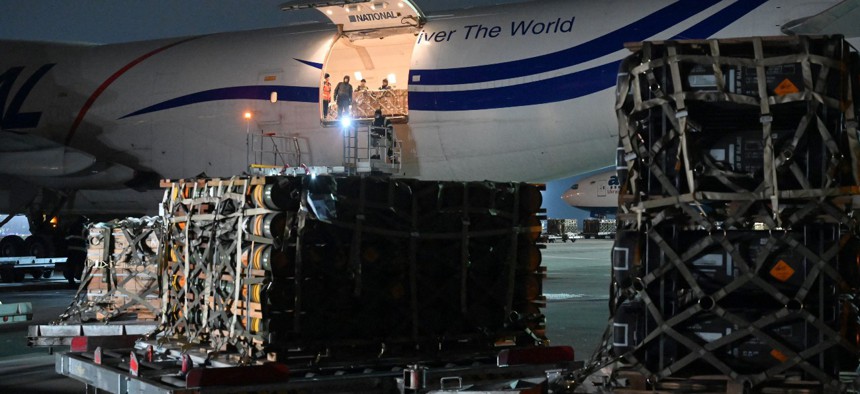
Employees unload a plane carrying U.S. security assistance provided to Ukraine, at Kyiv's airport on Jan. 25, 2022. The federal government has earmarked billions of dollars for security and humanitarian aid to Ukraine since March. Sergei Supinsky/Getty Images
Defense Department Record-Keeping Practices Are Hurting Oversight of Ukraine Aid, Inspector General Warns
The DoD watchdog previously teamed up with the State and USAID inspectors general for Ukraine-related oversight.
The Defense Department watchdog warned on Tuesday that some of the DOD’s and individual services’ practices for tracking and recording the movement of money and aid to Ukraine are hurting the office’s ability to track aid.
The DOD Inspector General’s office released an 18-page management advisory Tuesday on the department’s use of $6.5 billion from the Ukraine Supplemental Appropriations Act, which President Biden enacted in March as part of the 2022 Consolidated Appropriations Act. This is separate from the $40 billion aid package the president signed in May, which gave the State and U.S. Agency for International Development IG offices a funding boost and included reporting requirements for DoD.
“We observed that the [Office of the Under Secretary of Defense (Comptroller)/Chief Financial Officer] made improvements to their reporting processes and controls for Emergency Supplemental Funding as a result of lessons learned and recommendations from the CARES Act Management Advisory, including the [disaster emergency fund code] reporting requirements in the funding authorization documents,” the advisory stated. “However, as the DoD is building processes and procedures to ensure the transparency of the reporting for the Ukraine supplemental funds, we identified multiple areas of concern that, if not adequately addressed, could reduce the traceability of Ukraine supplemental funds and the transparency in the DoD’s reporting.”
The Defense Department is supposed to use a system for reporting called Advancing Analytics or Advana, according to the DoD controller. But the IG’s office found that the department frequently used systems that couldn't feed into the Advana platform. Furthermore, the Defense Department didn’t even start differentiating Ukraine funds from base funds until April, according to the report, and they made frequent use of journal vouchers to log transactions, vouchers that don’t hold as many details as other types of records.
“The use of summary journal vouchers is a concern because journal vouchers have the potential to limit the transparency of the funds, particularly if the summary journal vouchers do not trace back to the supporting transactions details,” the report notes.
When asked for comment, the Defense Department referred back to the IG.
Prior to the publication of the alert, Marine Corps Lt. Col. Anton Semelroth, Defense spokesman, told Government Executive that, “we remain committed to providing transparency to the public and to Congress about how security assistance funds are utilized. Defense articles provided are subject to standard end-use monitoring requirements, for which the Government of Ukraine has provided assurances that it will ensure physical protection and accountability.
“Ukrainian leadership has assured us that they understand the importance of accountability, and we are committed to working with them to further enhance accountability in the future," Semelroth added. "With that said, we acknowledge that Ukraine is fighting a war. This involves risk, which can only be minimized by the withdrawal from Ukraine by Russian forces.”
IGs Band Together
Before the alert on Tuesday, Acting DoD IG Sean O’Donnell outlined in a response to Sen. Chuck Grassley, R-Iowa, how his office formed a joint working group with the State and U.S. Agency for International Development IG offices for Ukraine oversight.

DOMINIKA ZARZYCKA/NURPHOTO VIA GETTY IMAGES
“This working group will ensure interagency communication and visibility of each agency’s ongoing work, and will identify opportunities for coordination between project teams. We will expand this working group, as appropriate, to include other [offices of inspectors general] whose agencies have equities in Ukraine,” wrote O’Donnell. “Working together, we can ensure comprehensive, coordinated oversight of funding provided to Ukraine.”
Also, at a recent media roundtable, O’Donnell said his office would be sending a senior auditor to Germany in July to meet with the European Command officials and the IG team that is already on the ground there.
As for the State IG office, Mark Huffman, spokesperson for the office, told Government Executive several teams are already assigned to projects and is working with its counterparts in the IG community, such as the Defense and USAID IGs, to “provide comprehensive, efficient oversight of wider U.S. government efforts associated with the situation in Ukraine.”
Nicole Angarella, acting deputy IG for USAID, wrote in a June 17 response to Grassley, “we have undertaken a collaborative approach with our oversight counterparts, both in the United States and with bilateral and multilateral donors” and noted they are in a working group with the State and Defense IGs for Ukraine oversight.
Are the Current IGs Enough?
For some lawmakers, the current IG lineup is not enough to oversee Ukraine assistance and they have crafted proposals to fix that.
In May, Sen. Rand Paul, R-Ky., delayed passage of $40 billion in aid to Ukraine and demanded that the Special Inspector for Afghanistan Reconstruction be given the authority to oversee Ukraine assistance.
Sen. John Kennedy, D-La., then introduced a bill that would establish a special IG position for Ukraine; a companion version was introduced in the House by Rep. Rob Wittman, R-Va., ranking member on the House Armed Services Committee, Rep. Elise Stefanik, R-NY, and Rep. Tim Walberg, R-Mich..
Paul’s proposal drew lukewarm support from a diverse coalition of 12 organizations–including the R Street Institute, Project on Government Oversight, and Taxpayers for Common Sense—who wrote in a June 1 letter to Senate leadership that it is “a reasonable, though less desirable, alternative path forward” as they say more important is getting Senate-confirmed officials in the posts of Defense IG and State IG.
There is a pending nominee for the DoD IG position, which has been filled by acting officials for more than six years and no nominee for State IG, which has been vacant for over two years. The group also panned the Kennedy-Wittman bill, which the letter said “would fail to provide an additional layer of transparency and oversight to U.S. aid to Ukraine between enactment of the act and establishment of the office, meaning that in the interim, large-scale and continuous U.S. assistance may remain unchecked.”
Also, Grassley, a long time advocate for government oversight, wrote in letters to the State, DoD and USAID IGs in late May that although the $40 billion aid package included additional IG office funds and reporting requirements, Congress hasn’t “come to a consensus on long-term, effective oversight mechanisms for these relief funds.”
Other Forms of Oversight
Besides the IG offices, the Government Accountability Office issues regular reports on various aspects of government management, operations and workforce issues.
For Ukraine-related investigations, a provision of the National Defense Authorization Act directs GAO to review “the allocation and use of security assistance in Ukraine, including efforts to monitor and ensure accountability for defense articles provided,” said Chuck Young, GAO managing director for public affairs. “We also have done a lot of work over the years on European posture and deterrence, refugees and humanitarian assistance, cyber operations, military readiness, and training that all have some relevance to the issues going on with Ukraine.”
GAO is working on a summary report to showcase this, which he anticipates will be out later this summer. “Also we have work just getting started on humanitarian assistance in conflict zones, focused on Ukraine,” Young added.
While not directly related to the Ukraine situation, but rather oversight of the Defense Department generally, GAO issued a decision on June 28 saying O’Donnell is serving as acting DoD IG illegally. “O’Donnell works at the pleasure of the president and will continue to do so until otherwise decided,” said a senior DoD IG official.
Historical Context
Ukraine has had a history of corruption, mostly under the Putin-aligned regime of Viktor Yanukovych, which fell in a 2014 uprising giving rise to Ukraine’s new more Western-aligned government. The country still has a score of 32 out of 100 on Transparency International's barometer of most corrupt countries (with a lower number signaling a higher level of corruption.) But, since 2014, Ukraine has launched five separate two-year action plans to address transparency in government and aid accountability. The 2020-2022 plan includes provisions on setting up new electronic monitoring procurement systems to better observe transparency and government transactions within the country.
The Defense Department IG official said that corruption in partner nations was always a concern and one that they were aware of and monitored closely as part of their regular inspections process.
John Sopko, the special inspector general for Afghanistan Reconstruction, told The Wall Street Journal last month that “even if it’s a noble cause, there’s going to be theft. There’s going to be misconduct,” in response to the Ukraine situation. Since its establishment in the 2008 National Defense Authorization Act, his office has overseen U.S. reconstruction efforts in Afghanistan.
“A couple of years from now, you’re going to be reading stories about waste, fraud and abuse,” Sopko added.






